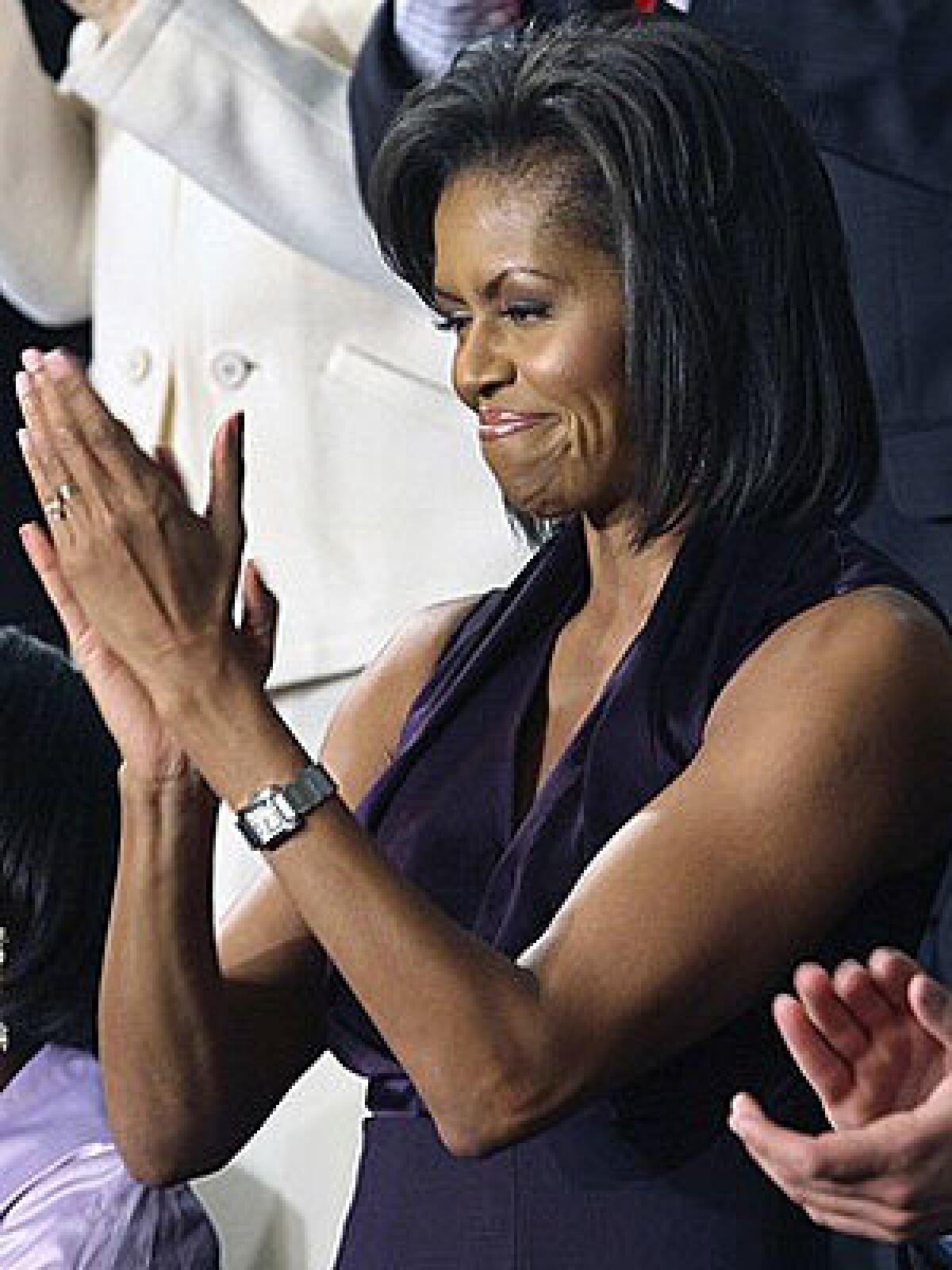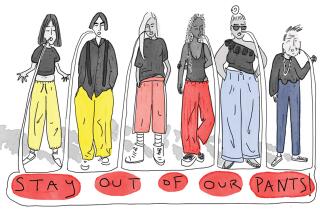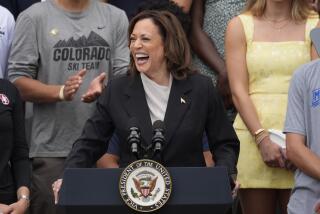Michelle Obamaâs toned arms are debated

First Lady Michelle Obama stands tall and regal in her official portrait, a double strand of creamy pearls around her neck, her figure clad in a fitted Michael Kors dress. But thereâs one aspect of this seemingly benign photograph thatâs causing something of a commotion, and it lies in that exposed 10-inch-or-so stretch between her shoulder and elbow. The first lady is buff, and sheâs not afraid to show it.
Her curvy biceps have become something of a lightning rod for remarks from both sexes in a larger discussion of how much female muscle constitutes too much. While some praise Obama as a role model in a world gone obese, others say sheâs gone too far in displaying the fruit of her workouts. Read one online forum comment: âThere is nothing uglier than manly, muscular arms on a woman. Mrs. Obama should be hiding them instead of showing them off.â
Even more vitriolic comments have been aimed at Madonna, whose Ăźber-ripped physique is a perennial favorite subject for photographers (the British press reported that her copious hours in the gym factored into the performerâs divorce). âMadonnaâs arms defy logic, actually get grosser,â reads one Web headline accompanying a picture of the singer, sleeveless, revealing her sculpted physique.
Why do we care so much? The issue speaks volumes about how men and women view the parameters of femininity and strength.
âIn some ways itâs kind of an old, tired way of thinking about women and power and boundary policing -- when you can display that power and when you canât, or when itâs appropriate,â says Sarah Banet-Weiser, an associate professor at the USC Annenberg School for Communication.
The idea of how much muscle is too much is entirely subjective, and people often have a visceral reaction to what they do or donât like. In the Obama-Madonna equation, itâs not surprising that few are in the Madonna camp, considering her well-defined build and low body fat, coupled with her age -- few 50-year-old women look like that.
Says personal trainer Ramona Braganza, a member of Goldâs Gym Fitness Institute, âSheâs burning so many calories constantly and her metabolismâs sky-high. Iâm not being hard on how she looks, but sometimes itâs nice to have a little body fat as you get older. Itâs just healthier looking, and people almost look younger when they do that.â
And though strong legs and a flat belly are often interpreted as sexy features on a woman, bulging biceps . . . not so much. âIt crosses the boundary from having sexy, toned arms to having arms that display, âHey, Iâm working on being strong.â â Banet-Weiser says. âThe evidence of that work . . . is quite threatening.â
For Obama (who told People magazine she hits the gym almost every day), the decision to wear sleeveless designs that show off her physique sends a strong message, says Janet Lee, deputy editor of Shape magazine. âIf she was at all self-conscious about her body, she wouldnât put it out there.â And that may be intimidating and unsettling to some who are used to seeing first ladies more covered up.
Yet arms are the one body part women often donât mind flaunting, Lee adds: âThey may have issues with their legs or their midriff, but they can get away with showing their arms.â When theyâre firm, Lee says, itâs like waving a flag. âItâs your fit calling card, and it lets people know that if your arms are in shape, your bodyâs in shape.â
The first ladyâs taut form may be forcing women to think about their upper-body musculature, but letâs not forget a potentially bigger influence: fashion. The sleeveless season is almost upon us. âThis is the time of year everyoneâs starting to think about bikinis and tank tops,â Lee says. âWomen are definitely wanting to firm things up so theyâll look toned and fit. The panic will be starting soon, no doubt.â
Though that fear may send them scrambling for the nearest lat pulldown machine, most women wonât be hitting the weights that hard. Because for all this talk of scary female muscles taking over the world, many women still believe that if they hoist more than 10-pound dumbbells for a few reps, theyâll look as massive as the Incredible Hulk. (That, by the way, is next to impossible unless the hoisting is accompanied by copious amounts of steroids.)
Even celebrities donât seem to want much upper-body definition (when not training for a specific role). Survey any red carpet lineup of stars clad in sleeveless and strapless gowns and youâll see thin arms, but not necessarily muscular ones. Braganza says some of the celebrities she trains -- especially those who have an athletic background -- donât fear a muscle striation or two. Braganza trained Anne Hathaway before this yearâs Oscars (the actress appeared in a silvery strapless Armani). She says Hathaway wanted to feel healthy overall, âtoned, but not in a very sculpted way.â
Perhaps women ultimately fear the kinds of reactions Nicole Ball fields continually. While the Alberta, Canada-based competitive female bodybuilder is not as muscular as some of the sportâs more extreme contestants, baring her ripped arms in public never fails to prompt reactions.
âYou can see out of the corner of your eye, you get looks,â she says. âSome people say, âWomen shouldnât look like that.â â Whereâs the happy medium for women? âIn society I donât think there is one,â she says. âEverybody should do what makes them feel secure in themselves and doesnât harm them.â
For some women, that may mean opting for plastic surgery instead of -- or in addition to -- lifting weights. When toned, the area between the elbow and shoulder communicates strength and vigor. But when skin begins to sag, it speaks of nothing but age. And the sad fact is that no amount of tricep dips will do anything to remedy the drooping flesh at the back of the arm when it becomes impervious to exercise. Maybe thatâs why brachioplasty -- an arm lift -- seems to be growing in popularity.
âThereâs no exercise that can get rid of the real problem,â says Dr. Lawrence Reed, a Manhattan-based plastic surgeon who teaches at New York Presbyterian Hospital. âItâs just hanging skin and extra fatâ -- which he refers to as âvisual stigmata of the aging process.â
As the first lady continues to go sleeveless -- she graces the March cover of Vogue, again showing some bicep -- only time will tell if her workout habits influence the culture. Lee, for one, hopes they do: âI like that we have these images of strong women,â she says. âIâd much rather see that than women who have no muscle tone. Iâd rather see a million Michelle Obamas.â


